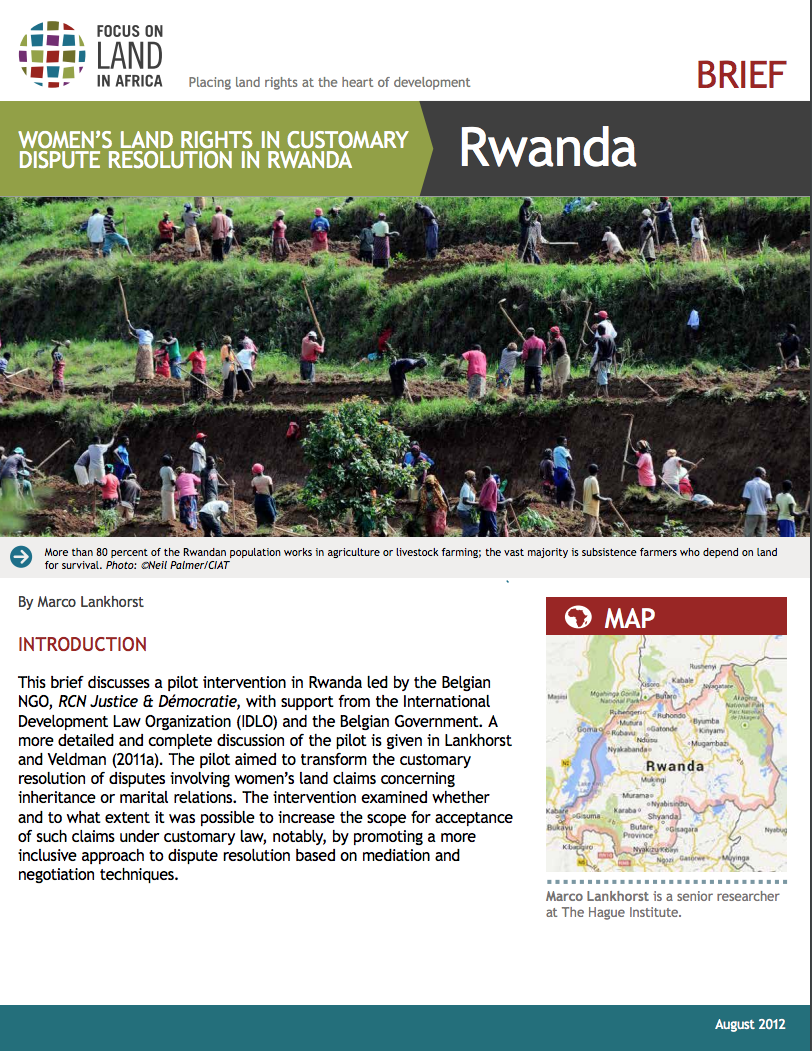The LAND Project is a five year program supported by the United States Agency for International Development (USAID). Its primary goal is strengthening the resilience of Rwandan citizens, communities and institutions and their ability to adapt to land-related economic, environmental and social changes.
Resilience is defined as “the ability to withstand or recover from difficult conditions.” It also comprises the ability of human and ecological systems to recover from shocks or difficult changes, and to transform to a better condition by responding flexibly and creatively to stress factors. In Rwanda, land tends to be one of the primary assets citizens rely on to buffer against difficult conditions and rapid change.
The project’s central objectives are twofold:
1.Increased capacity of local Rwandan institutions to generate high quality, evidence-based research on land-related issues that can be used by the Government, civil society organizations, and Rwandan citizens.
2. Increased understanding of land laws, policies, regulations, and legal judgments on land-related issues by GOR officials, local civil society organizations, research institutes and citizens.
Key outcomes of the project include:
- Holding annual National Land Research Agenda workshops to establish the research priorities of land sector stakeholders that the LAND Project will support. These workshops bring together multiple stakeholders from government, civil society and the research community;
- Supporting research on land-related issues through competitive awards to Rwandan research institutions, universities, and civil society organizations, and providing tailored capacity building assistance to improve research and advocacy capabilities;
- Offering training and other support to legal assistance providers to enhance their capacity to support women and vulnerable populations in understanding and realizing their land rights;
- Training local land authorities on the implementation of the land law and regulations.
- Carrying out research on critical land issues, including gendered land rights in practice, community rights to resources in and around protected areas, and expropriation.
- Managing a land-focused website to improve research, communications, and policy advocacy efforts that are focused on land, and to act as a vehicle for enhancing collaboration between actors working in the land sector;
- Providing organizational development support to civil society organizations supporting women’s land rights.
- Supporting innovative and coordinated communications approaches by civil society and government that enhance the knowledge of Rwandan citizens about research findings and their land rights.
Because the LAND Project is a five year endeavor, we are seeking an institution that has the interest, capacity, skills and resources to eventually take over hosting and maintenance of the website, ensuring it stays up-to-date and relevant to the land sector stakeholder community. If your organization is potentially interested in assuming management of this site, please contact us and tell us why you believe your institution would be an ideal candidate.
Members:
Resources
Displaying 41 - 45 of 149Women’s Land Rights in Customary Dispute Resolution in Rwanda: Lessons from a Pilot Intervention by RCN Justice et Démocratie
This brief discusses a pilot intervention in Rwanda led by the Belgian
NGO, RCN Justice & Démocratie, with support from the International
Development Law Organization (IDLO) and the Belgian Government. A
more detailed and complete discussion of the pilot is given in Lankhorst
and Veldman (2011a). The pilot aimed to transform the customary
resolution of disputes involving women’s land claims concerning
inheritance or marital relations. The intervention examined whether
and to what extent it was possible to increase the scope for acceptance
Empowering women through land tenure reform:The Rwandan experience
Since 2004, Rwanda has embarked on an ambitious land tenure reform programme (LTR) aimed
at increasing security of tenure to all land owners and the elimination of all forms of
discrimination. This has largely been achieved through the establishment and implementation of
a new legal, regulatory and institutional framework.
This paper discusses the ongoing land tenure reform programme and its impact on women’s land
rights. It focuses on the role of women in the decision making in the course of developing the
Empowering women through land tenure reform:The Rwandan experience
Since 2004, Rwanda has embarked on an ambitious land tenure reform programme (LTR) aimed
at increasing security of tenure to all land owners and the elimination of all forms of
discrimination. This has largely been achieved through the establishment and implementation of
a new legal, regulatory and institutional framework.
This paper discusses the ongoing land tenure reform programme and its impact on women’s land
rights. It focuses on the role of women in the decision making in the course of developing the
Farm Land Use Consolidation in Rwanda: Assessment from the perspective of the Agriculture Sector
Food crop production in Rwanda is predominantly dependent on the productivity in small- and fragmented farms. Raising productivity levels in smallholder farms therefore represents a vital means to economic growth and poverty reduction in Rwanda. Ministry of Agriculture and Animal Resources (MINAGRI) has embarked on a simplified land use consolidation model whereby farmers in a given area grow the priority food crops in a synchronized fashion while keeping their land rights intact.
Emerging in a Changing Climate – Sustainable Land Use Management in Rwanda
Durban COP17 December 2011 (UNFCCC 2011). The World held its breath for a global commitment to reducing greenhouse gas emissions in a bid to steady human-induced climate change. During the proceedings, one unique country, Rwanda, set fourth its ambitious national strategy for charting a green growth and climate resilient future.




